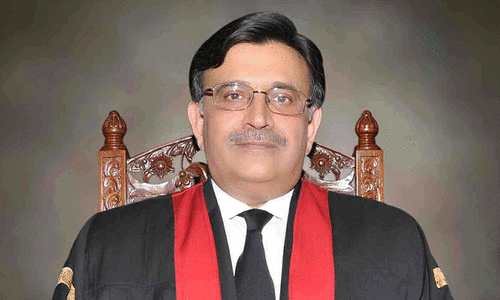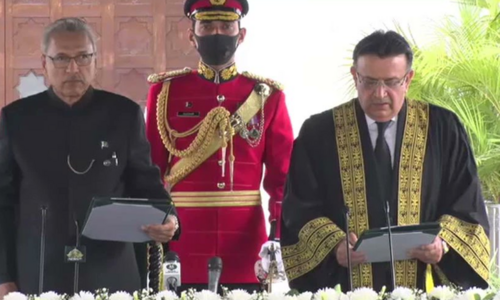ON the eve of being sworn in to the highest judicial office in Pakistan this week, Justice Umar Ata Bandial listed his two top priorities as the huge backlog of cases before the Supreme Court and what he called ‘scandalisation’ of judges in the media and social media.
He was speaking at the full court reference to honour the outgoing chief justice and his predecessor, Justice Gulzar Ahmed. Justice Bandial sought the assistance of the bar associations in dealing with the challenge where judges and not judgements are criticised.
People who know Mr Bandial since his student days describe him as an upright, learned man of law. A graduate of Columbia with a Law Tripos from Cambridge and abundant experience as a lawyer and as a judge of the superior courts, one can’t disagree with his contention.
Profile: Who is the new Chief Justice of Pakistan Umar Ata Bandial?
One need only look at the social media in particular and how Justice Qazi Faez Isa, who will succeed Chief Justice Bandial as chief justice, has been subjected to the most vile campaign by those irked or who felt slighted by his judgements. This is a glaring example of the travesty.
Even the relatively recent past throws up examples of the actions and conduct of august members of the judiciary that raise many a brow.
However, as a professional journalist, who has lead editorial teams in different organisations and was privileged enough to have edited this newspaper as well, I earnestly hope My Lordship will allow me the indulgence to seek a few clarifications.
Without delving deep into our history, which is replete with moments none of us can mention without acute embarrassment and unease, even the relatively recent past throws up examples of the actions and conduct of august members/leaders of the judiciary that raise many a brow.
We aren’t talking of verdicts on such black and white matters such as sanctifying military takeovers or other similar deviations from the Constitution or denial of a visibly fair trial to elected leaders where their office, liberty and even life was on the line.
The reference here is to seemingly mundane matters such as exemplified by former chief justice Saqib Nisar who, despite his impeccable legal credentials, often chose to act in a manner that cast his institution in controversial shadows.
What does a media decision-maker do in such instances? Where, for example, there is no judgement per se to criticise or draw attention to and where the solitary point to be made is about the behavioural pattern of someone holding, what is to me, a sacrosanct office?
Is completely ignoring and looking the other way for the media harmonious with its role as one of the guardians of public interest? By keeping silent is the media serving the public good, even as the holder of a sacrosanct office seems unconcerned about any such considerations?
There can be no two opinions that when judges choose only to speak through their verdicts that should form the only basis of assessment, of praise or criticism. Any other ‘line of attack’ is unacceptable and incorrect.
Let me share an example from media to humbly suggest that for each professional the quality and integrity of your work will determine whether you have a place in history or will be counted among the multitudes of also-rans.
A few years ago, this newspaper covered a significant story about the then elected leadership signalling a departure from the past of supporting militant groups as it was felt such a policy was unsustainable in the present global environment. Challenges such as FATF and isolation warranted the change in direction.
Of course, those responsible for executing that policy felt slighted and a chain reaction of rather tragic, for the country, events was triggered. One can trace the fragile state of the economy, galloping inflation and political instability today to those occurrences.
This was not all. The media and journalists involved in that coverage were forced to wade through a sea of fire because they’d done their job ie reported what happened in a meeting in the public interest and, I’d add, as it turns out, in the national interest too.
My colleagues were subjected to the vilest of slurs on social media and some TV channels, including those that have since earned considerable infamy as serial defamatory platforms, where they were called all manner of names.
They had their loyalty to the country and their commitment to the land of their birth questioned and their names and photos flashed on screen with fabricated stories which was tantamount to pinning a target to their backs and inciting the lunatic fringe to attack them.
My counsel then to my colleagues was to keep their nose to the grindstone and keep doing what they did best: quality journalism. All else won’t matter with the passage of time. Yes, I concede what I suggested is easier said than done. Considerable damage, particularly financial, was caused.
But it was gratifying to see that what the paper had reported on and supported editorially, was to become an integral part of the state’s survival strategy and policy over the following months. Of course, nobody trolled the state for its sensible turnaround even if it was unnecessarily delayed by so many months.
The chief justice has the credentials and the intellect to lead Pakistan into one of its brightest, proudest judicial eras. His focus, one can be sure, will remain on clearing the backlog of cases that runs into many, many thousands.
Criticism where it is tantamount to what the chief justice called scandalisation or character assassination of honourable members of the judiciary must be stopped dead in its tracks. However, where a diversity of opinion exists on substantive issues its expression can only be for the collective good.
In any case, it should be no more than a temporary distraction or not even that. Dispensation of justice, judicious and transparent elevations to the judiciary, and exemplary leadership should remain the topmost priorities and the qualitative change will be seen, felt and welcomed by all.
The writer is a former editor of Dawn.
Published in Dawn, February 6th, 2022















































